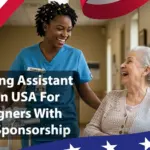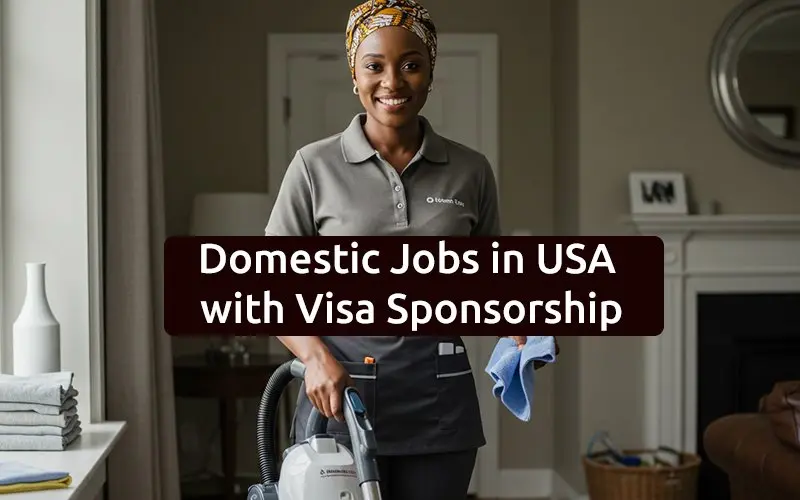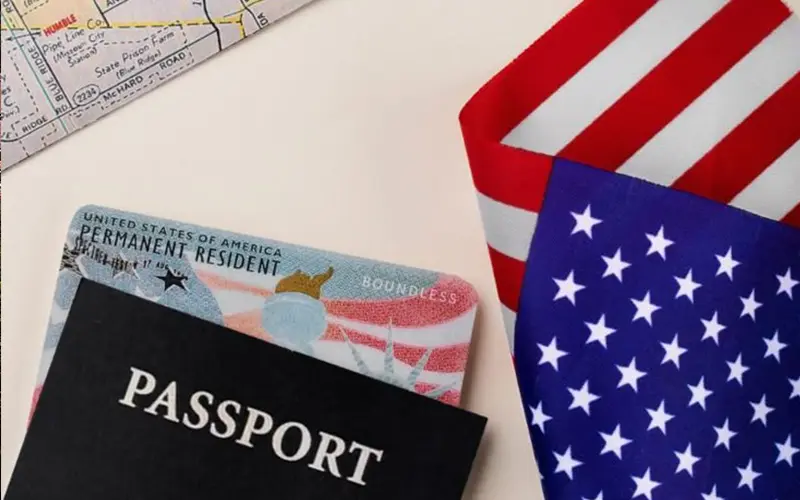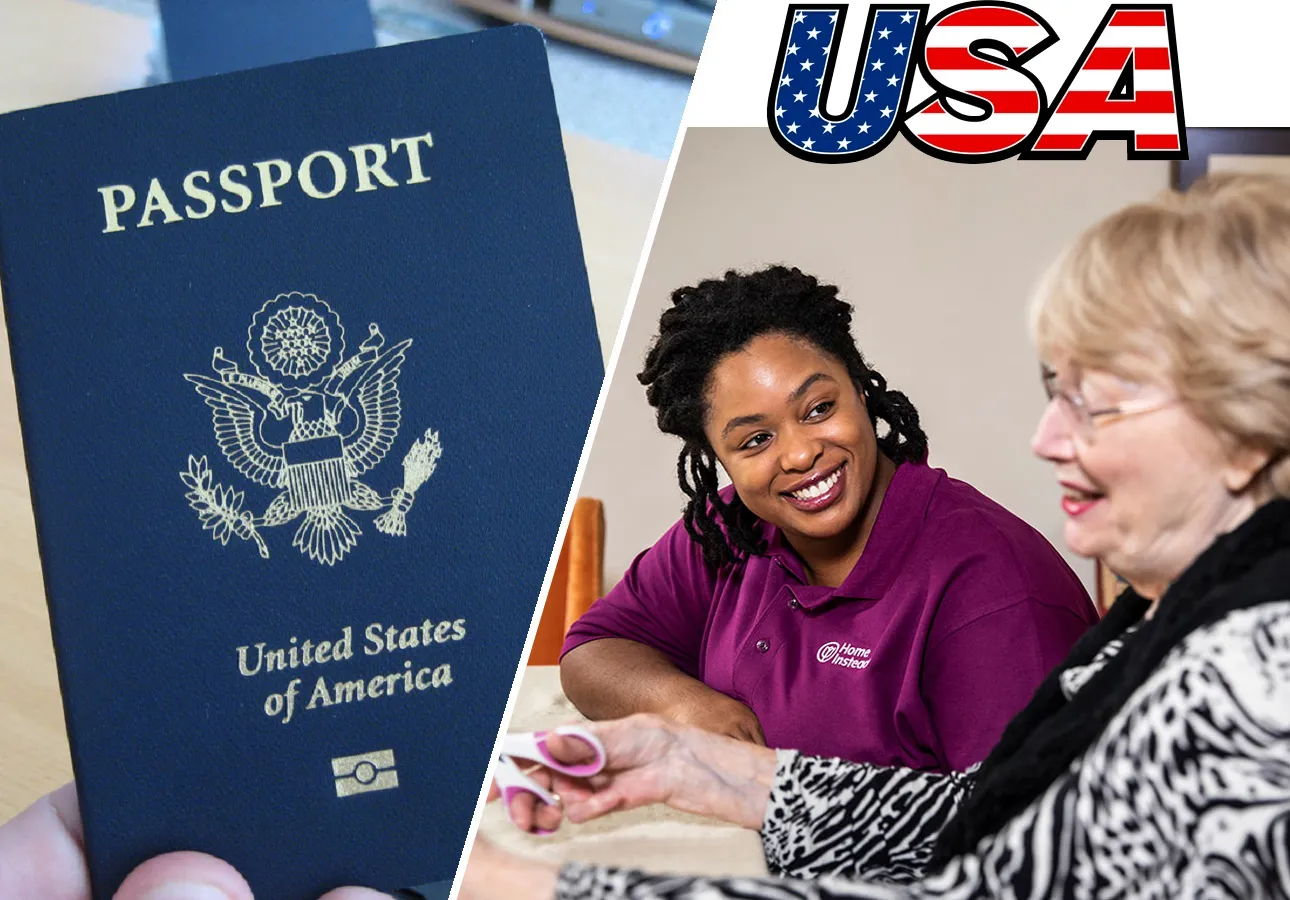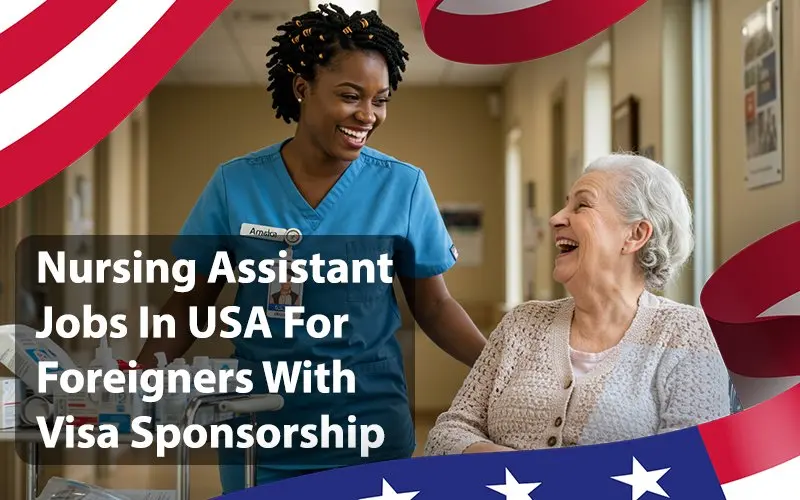The United States remains a beacon for global talent, offering diverse career paths across numerous industries. Among the sectors experiencing consistent growth and presenting tangible opportunities for foreign professionals is customer care.
For individuals outside the US possessing strong communication skills, cultural sensitivity, and a passion for service, securing a customer care job with visa sponsorship represents a viable pathway to live and work in America.
This comprehensive guide delves into the landscape of these roles, exploring the demand drivers, benefits, visa intricacies, requirements, job search strategies, compensation expectations, and the application journey.
Why Customer Care Jobs Are in High Demand
The demand for skilled customer care representatives (CCRs) in the USA is not merely steady; it’s robust and growing, fueled by several interconnected factors:
- The Primacy of Customer Experience (CX): In today’s hyper-competitive market, businesses recognize that superior customer service is a critical differentiator. Positive experiences drive customer loyalty, repeat business, and positive word-of-mouth. Investing in capable customer care teams is no longer optional but a core business strategy across industries – from tech giants and financial institutions to retail, healthcare, and telecommunications.
- Economic Expansion and Business Growth: As the US economy grows and new businesses emerge, the need to support customers inevitably expands. Startups scaling rapidly, established companies launching new products or entering new markets, and the sheer volume of consumer transactions all necessitate robust customer support infrastructures.
- Technological Evolution and Omnichannel Support: While automation and AI handle routine inquiries (via chatbots, IVR systems), complex issues, empathetic interactions, and nuanced problem-solving still require human agents. Furthermore, customers expect seamless support across multiple channels – phone, email, live chat, social media, messaging apps. This omnichannel reality requires more specialized agents capable of managing diverse interactions, increasing the need for skilled personnel.
- High Attrition Rates: Customer care roles can be demanding, dealing with frustrated customers and repetitive tasks. This environment, coupled with sometimes challenging metrics, leads to higher-than-average industry turnover rates. Companies constantly need to recruit and train new talent to maintain staffing levels and service quality.
- Globalization and 24/7 Support: Many US companies serve a global customer base across different time zones. Providing round-the-clock support requires staffing flexibility, often creating opportunities for bilingual or multilingual agents and those willing to work non-traditional hours. Foreign workers often bring valuable language skills and international perspectives.
- Specialization and Complexity: Products and services are becoming increasingly complex (e.g., fintech, SaaS platforms, advanced electronics). Supporting these requires agents with deeper technical knowledge, problem-solving abilities, and sometimes specialized certifications, moving beyond basic script-following roles.
This sustained demand creates a fertile ground for employers to look beyond domestic talent pools, opening doors for qualified foreign nationals through visa sponsorship programs.
Benefits of Working as a Customer Care Representative in the USA
Beyond the opportunity to live and work in the United States, a customer care role offers several intrinsic and extrinsic benefits:
- Gateway to the US Job Market: For many foreigners, a customer care position with visa sponsorship is a strategic entry point. It provides US work experience, builds a professional network, and can serve as a stepping stone to other roles within the same company or industry.
- Skill Development: These roles are excellent incubators for transferable skills. Agents hone exceptional communication (verbal and written), active listening, problem-solving, conflict resolution, empathy, patience, and adaptability. Proficiency with Customer Relationship Management (CRM) software and other support technologies is also gained.
- Career Progression Pathways: Customer care isn’t necessarily a dead-end job. High-performing agents can advance to roles like Team Lead, Supervisor, Trainer, Quality Assurance Specialist, or move into specialized support tiers (e.g., technical support, escalations). Experience in customer service is also valued in related fields like sales, account management, marketing, and operations.
- Stability and Structure: Large customer care operations, especially within established corporations, often offer stable employment with clear job descriptions, structured training programs, performance metrics, and defined schedules (though shift work is common).
- Exposure to Diverse Industries: Customer care roles exist in virtually every sector, allowing individuals to gain experience and knowledge in fields they find interesting, such as technology, finance, healthcare, travel, or entertainment.
- Potential for Flexibility: While many roles are office-based (especially for complex products or security reasons), the rise of cloud-based technology has significantly increased remote customer care opportunities. This flexibility can be attractive for work-life balance.
- Cultural Immersion: Working directly with American customers and colleagues provides deep cultural immersion, enhancing understanding of US business practices, communication styles, and societal norms.
Navigating Immigration: Visa Options for Customer Care Jobs
Securing a US work visa is the cornerstone for foreign nationals seeking customer care roles. While customer care isn’t always perceived as a “specialty occupation” like engineering or medicine, several visa pathways exist, each with specific requirements and limitations:
- H-1B Visa (Specialty Occupations):
- Concept: The most common professional work visa, designed for roles requiring theoretical and practical application of a body of highly specialized knowledge, typically requiring at least a bachelor’s degree or equivalent in a specific field.
- Applicability to Customer Care: Obtaining an H-1B for a standard customer care role is extremely challenging. USCIS often views these positions as not meeting the “specialty occupation” threshold, arguing they don’t inherently require a specific bachelor’s degree. However, it may be possible for highly specialized, senior, or technical support roles where the employer can convincingly demonstrate:
- The position requires a specific bachelor’s degree or higher (e.g., Computer Science for complex tech support, Finance for banking support specialists).
- The complexity of the product/service necessitates advanced, specialized knowledge typically gained through a degree.
- The duties go far beyond routine inquiries (e.g., deep technical troubleshooting, product development feedback analysis, managing enterprise-level accounts).
- Limitations: Subject to an annual cap (85,000 visas, including 20,000 for advanced degree holders from US institutions), a highly competitive lottery system, and higher filing costs for employers. Requires a Labor Condition Application (LCA) from the Department of Labor (DOL).
- L-1 Visa (Intracompany Transferee):
- Concept: For employees transferring from a foreign branch, subsidiary, affiliate, or parent company of a US employer to work in a managerial (L-1A) or specialized knowledge (L-1B) capacity.
- Applicability to Customer Care: More viable than H-1B for qualifying individuals. An employee with specialized knowledge of the company’s products, services, processes, procedures, or management systems, gained while working for the foreign entity for at least one continuous year within the last three, could potentially transfer to a US role requiring that specialized knowledge. This could apply to senior support specialists, trainers, quality analysts, or team leads with unique expertise critical to US operations. Management roles (L-1A) are also possible for supervisors/managers transferring to run US teams.
- Advantages: No annual cap. Can lead to a Green Card (permanent residency) path, especially for L-1A managers/executives. Faster processing options available (Premium Processing).
- TN Visa (Under USMCA/CUSMA – for Canadians and Mexicans):
- Concept: Created under the US-Mexico-Canada Agreement (USMCA, formerly NAFTA), allowing Canadian and Mexican citizens in specific professional occupations to work in the USA.
- Applicability to Customer Care: The TN occupation list includes roles like “Management Consultant” or “Technical Publications Writer,” but no category directly corresponds to a standard customer care representative. It’s generally not applicable for frontline CCR roles. However, highly specialized technical support roles requiring an engineering degree might potentially fall under an engineering category, but this is uncommon and requires careful legal analysis.
- E-3 Visa (For Australian Citizens):
- Concept: A special visa category exclusively for Australian nationals to work in the USA in a “specialty occupation.”
- Applicability to Customer Care: Similar challenges to the H-1B. While Australians benefit from a dedicated annual quota (10,500) that is rarely exhausted, the core requirement remains proving the role is a “specialty occupation.” Standard customer care positions typically do not meet this bar. Only specialized, degree-requiring roles would be considered.
- Other Potential Options (Less Common):
- O-1 Visa (Individuals with Extraordinary Ability): Highly unlikely for customer care roles unless the individual has truly exceptional, nationally or internationally recognized achievements in a field related to customer service (e.g., renowned customer experience strategist).
- J-1 Visa (Exchange Visitor): Some J-1 categories (like Trainee) might involve customer service components within a broader training program, but it’s temporary and has a home residency requirement. Not a direct path to long-term employment.
- Green Card (Permanent Residency): An employer could potentially sponsor a foreign national for a Green Card (e.g., EB-3 for “Professionals” or “Skilled Workers”), but this is a lengthy, expensive process usually reserved for roles where the employer struggles to find qualified US workers. Proving a shortage for customer care roles is difficult. It’s more feasible for individuals already working in the US on another visa (like L-1) who transition to permanent residency.
Key Takeaway: The L-1 visa presents the most realistic pathway for foreign nationals seeking customer care roles in the USA, primarily through intracompany transfers involving specialized knowledge or management.
The H-1B remains a possibility only for highly specialized, senior, or technical support positions where the employer can robustly justify the “specialty occupation” requirement. Standard frontline customer care representative positions are very difficult to sponsor directly from abroad due to visa category limitations.
Requirements and Eligibility for Customer Care Jobs in the USA
Beyond visa eligibility, foreign candidates must meet the core job requirements demanded by US employers. These typically include:
- Language Proficiency: Exceptional English proficiency is paramount. This encompasses clear verbal communication (accent neutral enough for easy understanding by diverse US customers), precise written communication for emails and chats, active listening skills, and strong reading comprehension. Fluency in other languages (especially Spanish) is a significant asset, particularly for companies serving diverse populations or international markets.
- Education: While entry-level roles may only require a high school diploma or equivalent, many employers prefer candidates with an associate’s or bachelor’s degree. Degrees in Communications, Business Administration, Psychology, or related fields can be advantageous. For specialized support roles (technical, financial), relevant degrees or certifications become more critical and align better with visa sponsorship attempts (e.g., H-1B).
- Experience: Prior customer service experience is highly valued. Employers look for demonstrated abilities in handling customer inquiries, resolving complaints, de-escalating tense situations, and achieving positive outcomes. Experience in the specific industry (e.g., tech, finance, healthcare) is a strong plus.
- Technical Skills: Proficiency with computers, operating systems, common business software (MS Office, Google Suite), and the ability to quickly learn proprietary CRM systems (like Salesforce, Zendesk, ServiceNow) is essential. Typing speed and accuracy are often tested.
- Soft Skills: This is the bedrock of customer care success:
- Empathy and Patience: Understanding and relating to customer frustrations.
- Problem-Solving and Critical Thinking: Analyzing issues and finding effective solutions.
- Adaptability and Resilience: Handling high volumes, diverse customer personalities, and stressful situations without burnout.
- Positive Attitude and Professionalism: Maintaining composure and a helpful demeanor.
- Attention to Detail: Accurately documenting interactions and following procedures.
- Cultural Fit and Understanding: Awareness of US cultural norms, communication styles (often more direct than some cultures), and business etiquette is crucial for effective interaction with customers and colleagues.
- Work Authorization: For roles offering sponsorship, employers will clearly state this. Candidates must be prepared to navigate the visa process if sponsored. For roles not offering sponsorship, candidates must already possess valid US work authorization (e.g., Green Card, EAD through spouse, OPT/STEM OPT).
The Job Hunt: How to Find Customer Care Jobs in the USA with Visa Sponsorship
Finding these specific opportunities requires a targeted and persistent approach:
- Leverage Specialized Job Boards:
- General Job Sites (Use Advanced Filters): Use filters for “Visa Sponsorship” on major platforms like LinkedIn, Indeed, Glassdoor, and Monster. Search terms like “customer care specialist visa sponsorship,” “customer service representative L-1 visa,” “technical support H-1B sponsorship.”
- International/Niche Job Boards: Sites like MyVisaJobs (specifically tracks employers filing H-1B, L-1, etc.), VisaJourney (forums often have job sections), The American Dream (tailored for foreign job seekers), and GoinGlobal (requires subscription, offers country-specific guides and job listings).
- Target Multinational Corporations (MNCs): Large companies with global operations are the primary sponsors of L-1 visas. Research MNCs known for large customer service centers (e.g., Amazon, Apple, Microsoft, Google, major banks like JPMorgan Chase or Bank of America, telecoms like Verizon or AT&T, large retailers). Check their global career sites specifically for US-based roles and sponsorship information.
- Explore Outsourcing/BPO Companies: Companies like Teleperformance, Concentrix, Sitel Group, TTEC, and Alorica operate massive customer service centers globally, often handling contracts for major brands. They frequently manage international transfers and may have specific programs or be more familiar with visa processes (particularly L-1) for moving experienced agents to US sites.
- Network Strategically:
- LinkedIn: Optimize your profile with keywords (“customer service,” “visa sponsorship,” “L-1 transfer,” languages spoken). Connect with recruiters specializing in customer service or your target industry. Join relevant groups. Reach out respectfully to individuals working in US customer care roles or at your target companies.
- Professional Associations: Join groups like the Customer Experience Professionals Association (CXPA) or industry-specific associations. Attend virtual or in-person events if possible.
- Alumni Networks: Connect with alumni from your university who work in the US.
- Work with International Recruiters/Staffing Agencies: Some recruitment agencies specialize in placing foreign talent in the US. Research agencies with expertise in customer service roles and visa processes. Be clear about your sponsorship needs upfront. Examples include Robert Half, Randstad, but also look for niche agencies focused on global mobility.
- Direct Applications: If you identify a specific company known for sponsorship and have a relevant background (especially for an L-1 transfer within the same company), apply directly through their careers page. Tailor your resume and cover letter meticulously.
- Refine Your Search Terms: Experiment with variations: “customer support,” “client success,” “technical support,” “help desk,” “service desk,” “customer experience associate,” combined with “visa sponsorship,” “L-1 transfer,” “work authorization assistance.”
Average Salary of Customer Care Representatives in the USA
Salaries for customer care roles vary significantly based on location, industry, experience level, company size, complexity of the role, and whether the position is specialized (e.g., technical support). Here’s a general overview based on recent data from sources like the U.S. Bureau of Labor Statistics (BLS), Salary.com, Glassdoor, and Indeed:
- National Averages:
- Customer Service Representative (Entry-Level/General): $35,000 – $45,000 per year.
- Customer Service Representative (Experienced): $40,000 – $55,000 per year.
- Technical Support Specialist: $45,000 – $70,000+ per year (higher end for complex IT/software support).
- Team Lead/Supervisor: $50,000 – $75,000+ per year.
- Location Impact: Salaries are substantially higher in major metropolitan areas with a high cost of living (CoL):
- San Francisco Bay Area, New York City, Boston, Seattle: Salaries can be 20-40% above national averages.
- Midwest, Southeast, Smaller Cities: Salaries often align closer to or slightly below national averages. Remote roles may adjust salary based on the employee’s location.
- Industry Impact: Tech companies, financial services, and specialized industries often pay more than retail or hospitality.
- Benefits: Beyond base salary, many full-time roles include benefits packages that significantly add to total compensation:
- Health, dental, and vision insurance
- Retirement savings plans (401k, often with employer matching)
- Paid time off (vacation, sick leave, holidays)
- Potential bonuses or incentives based on performance metrics
- Employee discounts, wellness programs, tuition reimbursement
- Visa Status Consideration: Salaries for sponsored positions must meet the “prevailing wage” determined by the Department of Labor (DOL) for the specific role and location, especially for H-1B and L-1 visas. This ensures foreign workers are paid comparably to US workers in similar roles. Employers sponsoring visas are generally aware of this requirement.
Customer care roles in the USA offer a genuine entry point for foreign professionals, driven by persistent industry demand and the globalization of service. While the path via direct H-1B sponsorship for standard roles is fraught with difficulty, the L-1 intracompany transfer route provides a significant and viable avenue, particularly for those already employed by multinational corporations with US operations. Success hinges on understanding the specific visa landscape, possessing exceptional English and customer service skills, targeting the right employers (MNCs, large BPOs), and leveraging strategic job search methods.
The journey requires patience, persistence, and meticulous preparation. By setting realistic expectations, focusing efforts on the most feasible pathways, and utilizing the comprehensive information and resources available, qualified foreign nationals can navigate the complexities and pursue their goal of building a customer care career in the United States. Remember, visa laws and processes can change; always refer to the official U.S. government websites (USCIS, DOS, DOL) for the most current information and procedures.
